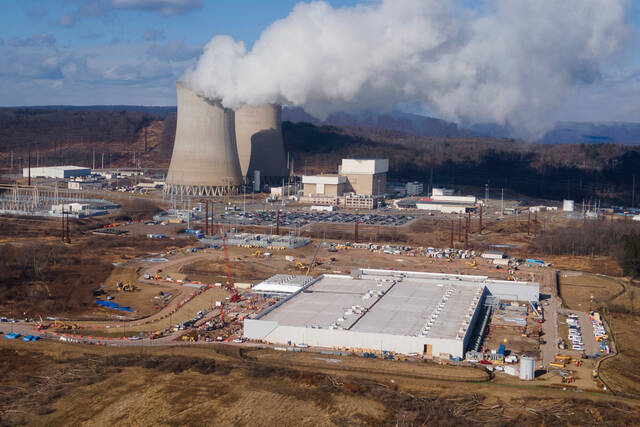In light of the disastrous train derailment near the Pennsylvania-Ohio border earlier this month, the Pa. Senate Transportation Committee held a hearing Monday on railroad regulations — or, in many ways, the lack thereof.
The hearing — spurred by the Feb. 3 East Palestine incident that spilled thousands of gallons of toxic chemicals — was intended to explore how the rail transit of hazardous materials is controlled, senators said.
But many of the matters discussed, the senators discovered, were industry best practices and not hard-and-fast regulations. Further, the federal government’s claim to sole regulatory authority under the commerce clause of the U.S. Constitution means that Pennsylvania has limited power to institute is own rules, even if it wanted to.
“The ability for the commonwealth to have its own set of regulations with respect to interstate commerce is prohibited by that section of the Constitution,” said Mike Carroll, PennDOT’s acting secretary.
This month’s derailment of a Norfolk Southern train in Ohio, less than a mile from the Pennsylvania border, has had a widespread impact. Mass testing of water supplies in the region is now underway, as is the removal of massive quantities of contaminated waste water and soil near where crews extinguished burning chemicals; 38 train cars were involved, 11 of which were classified as carrying hazardous materials.
Both the federal government and the rail industry collect data on how often such incidents occur. Carl Belke — president of the Keystone State Railroad Association, an industry trade group — cited statistics from the American Association of Railroads stating that hazmat rail accident rates have dropped 55 percent in the last decade and remain far lower than other transportation methods.
But some broader measures tell a different story. The rate of train accidents — exclusive of road crossing collisions, employee illness, and other factors not involving the trains and rails themselves — stood at 2.94 per million miles in 2022, up from 2.47 a decade ago, according to the Federal Railroad Administration (FRA).
Further, only certain incidents are required to be reported to the FRA, such as those involving personal injury or those with damages exceeding an FRA-established dollar value, leaving the possibility that minor derailments — where wheels become misaligned without causing a crash — are far more common.
“That type of stuff happens once a week, twice a week in the state of Pennsylvania. Nobody knows about it, no one needs to know about it,” Belke said, since the car is hoisted back into the proper position by crews without causing any problems for the public.
Rail companies might keep track of such incidents, but if the derailments don’t meet the FRA threshold, “everything would be all internal,” Belke told committee chair Wayne Langerholc, R-Cambria.
Several of the other points queried by senators on Monday were also matters of industry best practice, Belke indicated, and not any concrete state or federal statute.
Sen. Marty Flynn, D-Lackawanna, asked Belke if there were any FRA mandates as to the number of crew members on a given train, which Belke indicated there are not. Most modern trains have two to three people on board, Belke said, fewer than in years past since more crew duties can be handled with technology.
“When I started there were five or six people on trains, and there were many more accidents and many more injuries with those five and six people [compared to now],” Belke said.
Flynn also asked about braking requirements, particularly the federal government’s interest in electronically controlled pneumatic (ECP) brakes, which engage all of the train cars’ brakes via electronic trigger, giving faster and more responsive stopping power.
Federal regulators had proposed requiring ECP brakes on certain trains, but the rule was quashed by the Trump administration in 2017; the rule as written, even if it had come to fruition, would likely not have applied to the train in the East Palestine incident, according to the chair of the National Transportation Safety Board.
Belke said many rail systems have moved toward a “distributed power” system, which involves locomotives dispersed throughout the line of cars, each providing their own braking power. Distributed power braking is “essentially giving you the same result as ECP braking” without federal regulators putting any actual additional braking rules in place, Belke said.
Sen. Carmera Bartolotta, R-Washington, likewise asked about the use of trackside detectors, which can alert crews to overheating parts. Detectors showed an overheating wheel bearing on the East Palestine train shortly before it derailed, according to the NTSB, but Norfolk Southern instructs crews to ignore those alerts in many circumstances, according to a recent ProPublica report.
As with the crew complement and braking matters, Belke indicated that there are no hard oversight rules involved. The FRA does publish a guide for implementing trackside detectors, but does not have mandates on who must have them or how they are to be used.
Despite senators’ concerns, Pennsylvania’s direct control of the regulatory environment is limited. In 1970, the Congress exercised its commerce clause power to pass a law standardizing all rail regulations under the FRA and limiting states’ abilities to act outside of this.
The Pennsylvania Public Utility Commission employs 10 rail inspectors who do unannounced examinations on rail lines statewide, according to PUC chair Gladys Brown Dutrieuille and PUC Rail Safety Manager Rodney Bender.
But these inspectors are acting on behalf of the federal government, Dutrieuille and Bender said, and state inspectors cannot issue fines or orders of their own accord but rather report their inspection results and any violations to the FRA for possible enforcement.
Only in situations where the railway impacts a state-controlled utility, such as at road crossings, do the PUC and PennDOT have direct jurisdiction, Dutrieuille and Carroll said.
The fact that state inspectors are left to report their findings to the FRA and cross their fingers that the feds will act did not sit well with Flynn, who repeatedly questioned what enforcement recourse the state was left with to deal with companies such as Norfolk Southern.
“I’ve run into many roadblocks with this company where they’re not very receptive toward any kind of upkeep or improvement of their properties,” Flynn said.
Also on Monday, Gov. Josh Shapiro announced that the state health department would be setting up a resource center in Darlington Township, Allegheny County, the area of Pennsylvania closest to the derailment site.
Many residents had to evacuate during what Norfolk Southern said was a controlled burn of leaked vinyl chloride in order to prevent an explosion, a move. Some have reported health problems upon their return, and the Pennsylvania Department of Environmental Protection is now systematically testing drinking water in the area.
Shapiro said last week that his administration had made a criminal referral to the state attorney general on the matter, with Shapiro questioning Norfolk Southern’s decision to conduct the chemical burn amid what he described as a history of the railway prioritizing speed over safety.








